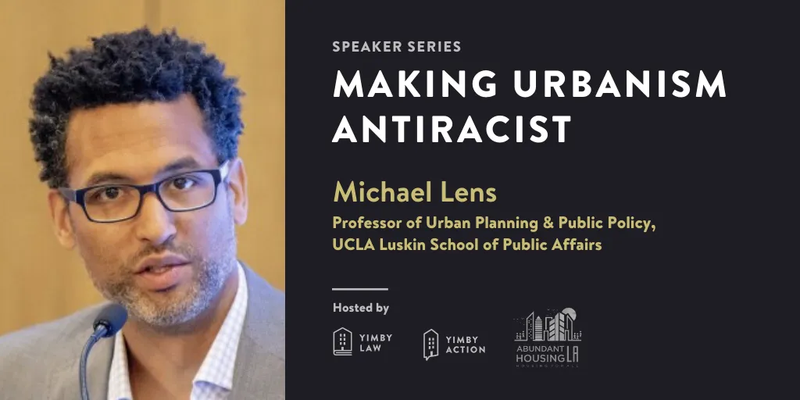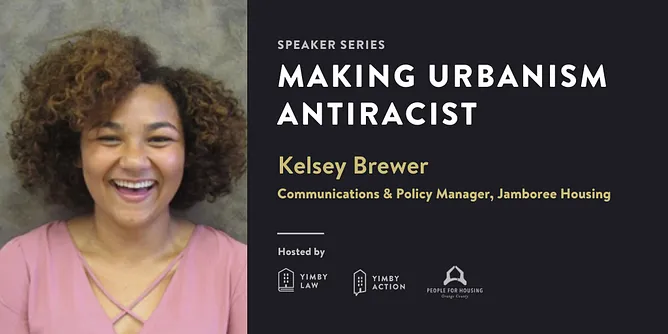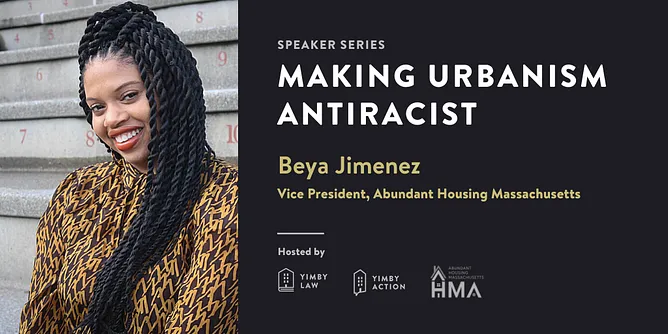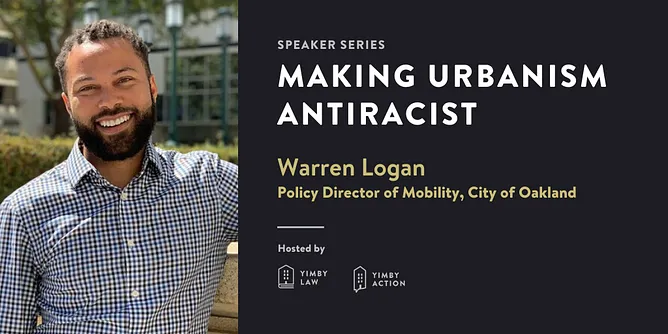As the horrific murders of George Floyd, Breonna Taylor, and Ahmaud Arbery launched a nationwide reckoning with the depth of structural racism, YIMBYs knew we also had to do our own reckoning. We are part of an urbanist movement with a long legacy of building spaces that have marginalized Black communities and excluded Black voices from our decision-making, even as we have fought against segregationist housing policy. We have so much work to do. So YIMBY Action is starting a series of conversations called “Making Urbanism Antiracist.” Our hope is that these conversations can help us do the work with intention.
We kicked the series off on June 23rd with a thought-provoking conversation with Warren Logan. As Policy Director of Mobility and Interagency Relations for the Mayor’s Office of Oakland, Warren is an advisor to the mayor on what role transportation can play for Oakland and what role Oakland can play in the region.
Often urbanists can focus on the technical and the literal, but Logan pushes us to focus on the human. Instead of charts and graphs, Logan goes deeper in his work to understand how people are interacting with public spaces. It’s a good reminder to us that numbers can sometimes hide as much as they illuminate.
My philosophy on engagement is very much anti-outreach, anti-information, which is to say that I think that not just government stakeholders, but a lot of groups, do a very good job of sharing out information. We have a lot of technology that helps you share out information: there’s Twitter, there’s Facebook. It’s a whole different cloth to have a conversation with someone in a very vulnerable space, and so I actually discourage people from meeting me in my office. Most people will find that I regularly will say, “Oh, let me take you to coffee. Let’s go meet in your neighborhood.” A really good example of the engagement I like is there is a neighborhood crime prevention group in the Melrose district here in Oakland, and they were very upset about this really busy street on a portion of Foothill… This woman said to me, “I dare you to come to my house at night on a Friday night, and you will see what this is like.” I was like, “Great! I’ll bring the chips and wine, and let’s see how it goes.” And it was great to just sit on her porch and talk about her life living in this home for many years and watching how the street has changed and then her understanding of safety and its connection to community.
Warren pushes us to pull antiracism into the work we are doing every day, rather than seeing it as a box to check. Rather than adding equity on top, how do we bring those goals into every part of our work?
When I first started in city planning 10 years ago, planners were just starting to have the conversation about how to bring equity into the conversation: how do we sprinkle it on to the discussion, right?
And now we’re like, “Okay, you know, how do I be antiracist?” And one of the things I’m just going to repeat from several other amazing Black planners… is that city planning, and by extension government, is not neutral. All of the things that we do are hurting or not hurting groups of people, primarily Black and brown communities. And so, I think that what antiracism looks like is transforming the questions that we are typically asking as equity issues, saying “Does this harm the Black and brown community?” and switching that to a question about “Are we advancing and prioritizing Black and brown communities to thrive and, frankly, address historic wrongs?” That is sort of the paradigm shift that I think is really underscoring what being antiracist means in the context of my work.
More highlights include:
- His role in Oakland government both before and after COVID-19 (17:00)
- What COVID-19 teaches us about local government’s abilities in an emergency, and how we might be able to use those abilities more constructively for Black & brown communities (18:00 & 23:30)
- Why he is “anti-outreach” and “anti-information” (21:20)
- How Oakland’s experiment with Open Streets shows us what constructive government engagement with Black & brown communities can look like (36:25)
- What antiracism means to him in urban planning (32:25)
- The importance of compensating community partners for their time (40:00)
- How zoning can be like the secret In-N-Out menu (66:19)
- How YIMBYs may be able to work to repair some of their relationships with Black & brown neighbors (60:19)
Thanks so much to Ernest Brown, our YIMBY Action Board Chair, who conducted the interview. Thanks also to Board Member Sasha Aikin for compiling this blog post recap.
If you enjoyed this talk, please consider attending one of the upcoming talks in the series or joining YIMBY Action as a member!
Join us for the next in the series:




